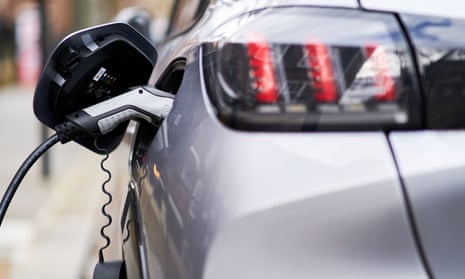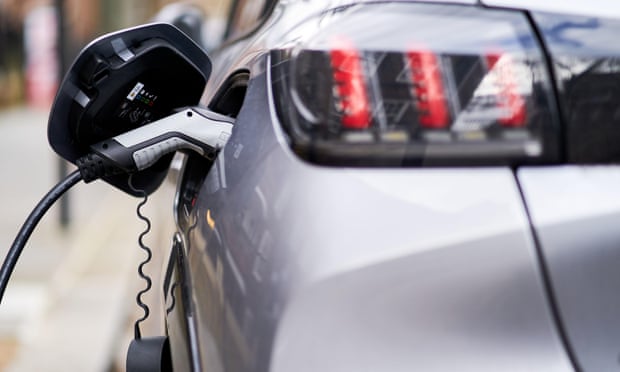
UK has almost 1m EV chargers, with new public one installed every 25 minutes
Electric vehicle industry says spring data shows installations are keeping pace with rising battery sales
There are now almost 1m electric car chargers in the UK, according to data, a figure that the industry argues is proof that installations are keeping pace with increasing sales of battery vehicles.
There were 930,000 UK chargers at the end of June, according to ChargeUK, a lobby group, but the majority of these have been installed in homes and business premises, with only about 65,000 public chargers available.
Public chargers range from ultra-rapids at motorway services to slow chargers on lamp-posts.
The ChargeUK analysis showed that a new public charger was installed every 25 minutes in the spring quarter as companies raced to keep up with demand. Companies installed 5,100 public chargers during the second quarter of 2024, according to the data company Zapmap.
The shift from polluting petrol and diesel vehicles to electric technology is seen as crucial for the world to cut carbon emissions and limit global heating. However, the perception of a slow rollout of charge points has been an important factor holding back some drivers from switching to electric cars.
Vicky Read, the chief executive of ChargeUK, said that the analysis suggested some of those concerns may be misplaced.
She said: “In little more than a decade, the UK’s charging sector has grown to become a major player in the green economy, providing the infrastructure that more than a million EV drivers rely on today and scaling fast to deliver the charging needed through to 2030 and beyond.”
There are 1.1m electric vehicles on UK roads, including 167,000 cars sold in the first half of this year, according to the Society of Motor Manufacturers and Traders lobby group. That is a 9% increase compared with the previous year, although the share of electric sales only increased marginally to 16.6%, as relatively higher upfront prices and rising interest rates deterred some buyers.
Quick Guide
Electric vehicle charging speeds
Show

Not all chargers are created equal
More and more people are buying electric cars, and are having to grapple with charging for the first time. However, not all chargers are created equal, and the profusion of units can cause confusion.
Charging speeds are measured by power output in kilowatts (kW), while battery capacity is measured in kilowatt hours (kWh). For example, a Nissan Leaf has 39kWh of battery capacity, while a Tesla Model Y has 60kWh.
Recharge times vary depending on battery size: divide the battery size by the power to get a very rough idea of how many hours it will take to charge. (E.g., a 60kWh battery at a 22kW charger would take about three hours.) The quicker the charge, the more it tends to cost.
Slow: 3kW to 6kW
Common at homes, and on-street chargers. Suitable for charging overnight. Plugging in with a UK three-pin plug to the mains at home will deliver about 2.3kW – although it is not recommended.
Fast: 7kW to 22kW
Found at urban sites like supermarkets and shopping centres. Capable of charging a smaller battery in a few hours.
Rapid: 23kW to 100kW
Motorway service stations and dedicated public charging hubs. 50kW could give an 80% charge in less than an hour.
Ultra-rapid: 100kW and above
Some of the newest and most expensive cars can handle power up to 270kW, adding hundreds of miles of range in 10 minutes.
ChargeUK’s analysis, which was carried out by the thinktank New AutoMotive, suggested that the private sector was confident it could meet a target set by the previous Conservative government of 300,000 public charge points by 2030.
after newsletter promotion
Labour promised in its general election manifesto to “accelerate the rollout of charge points”, although it has not detailed how it will do this or whether it will stick to the 300,000 target.
However, the charge point industry is concerned that the pace could slow if the government does not take action to speed up connections to the electricity grid and make it easier to receive permits and planning approvals for public chargers.
“While the outlook is positive, there is still work to be done,” Read said. “Delivering what the UK needs by 2030 means continuing to grow at pace, ensuring that deployment ramps up in locations that have been hampered by delays, and ensuring the UK has a thriving EV market, so that investment in infrastructure continues at scale.”
Shell Recharge, owned by the FTSE 100 oil company, is the leader in providing the most public charging points in the UK, with just under 9,000 public charging points. Pod Point and Connected Kerb are the next largest companies in a competitive market, with about 5,000 apiece.